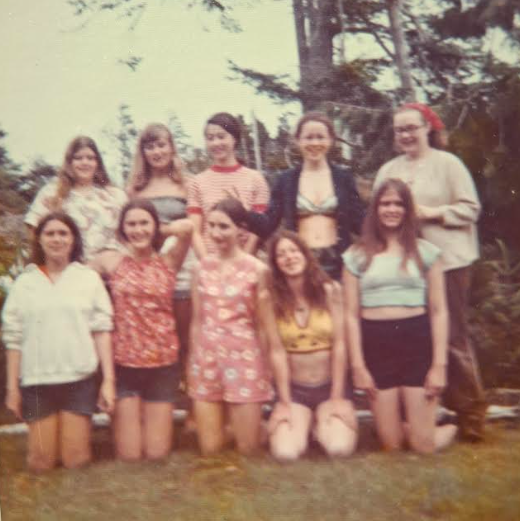
A real friend always shows up to support you. They are at your door with ice cream after a bad breakup, they are the ones cheering you on during your big soccer game, and they are the ones tearfully saying goodbye when you go off to college. Cultivating a genuine friendship takes effort, but it is highly rewarding.
Forming friendships is one of the most natural things humans do. From a 3-year-old girl meeting a new playmate on the playground to a 90-year-old woman completing crosswords with her friend of 80 years, friendships can accompany people through a lifetime. One of the most astonishing and beautiful things about a friendship is how long it can last when properly cared for.
“Friends [are people to] explore new interests [with and] talk [to] when you are starting to question your beliefs,” says Krystal Toderick, a counselor at Franklin. Toderick explains, “[The high school] age group, [from] about 14 to 19 … do most of [their] learning from [their] peers.” She says, “[They are not] going to learn from [their] parents really anymore … this is where [they] start to develop [their] own identity.” Friendships from a person’s youth help to shape their identity and future self.“[Friends] can help you reflect … and help you develop your own ideas,” she adds.
Britt Jorgenson, a long-time Portlander who now works in Marketing and Innovation at adidas, is still close with some of her friends from childhood. They meet frequently, and their bond remains strong despite the years. “[I have] known [my friend Julie] since we were five, so even before kindergarten. [We] grew up across the street from [each other] and [we] also went to Franklin [together],” explains Jorgenson. “The first time that I met her, she offered me a piece of gum. I thought that was pretty nice.” A simple act of kindness can let those around you know you care and be more open to getting to know you, laying a foundation for a long-lasting friendship.
According to the American Psychological Association, “People who have friends and close confidants are more satisfied with their lives and less likely to suffer from depression.” Spending time with friends is proven to make people happier. Jorgenson says, “I think that [friends] just enrich your life and … help [to] make you a fuller person.”
Jorgenson shares, “There’s something kind of special about friends that you have from when you’re younger, because they know you, they know where you came from. They know what kind of experience[s] ha[ve] … formed you … [into] the person that you are.” Old friends who have accompanied you through your life’s difficult moments are the ones who know the parts of you that others do not. Jorgenson explains how she and her friend have supported each other through difficult times: “We would just … listen to each other. Sometimes we would distract each other … [by inviting] each other to do things that had nothing to do with whatever the problem was … just to … give them a little bit of time to not have to think about it.”
Jorgenson admires many qualities in her long-time friends, but the most prominent trait she describes is their positivity. “[My friend] Lisa just has such a bright positivity, and a really unique way of looking at the world that’s super positive, super creative, really playful, [and] kind of fun,” says Jorgenson. These characteristics really spoke to Jorgenson when they met, and she loves how much brightness Lisa brings into her life.
“[Friends] let you be who you want to be. There [are] no expectations of behavior … we respect other people’s beliefs,” explains Leslie Sawyer, a retired registered nurse who grew up in Salem, OR, and later moved to Portland. Sawyer has maintained several close friendships since childhood, a bond she and her friends refer to as “The Sisterhood.” She has known her childhood friends for about 50 years, and they remain a huge part of her life.
She met one of these friends, Mary Beth, in second grade. Mary Beth wrote her a touching get-well card in second grade, and Sawyer still remembers how kind it was. Mary Beth moved away for a couple of years, but when she returned to the same school as Sawyer, their friendship rekindled. “We just sort of lost track of each other, and so our friendship just melded even more,” Sawyer describes. “The sign [someone is] a true friend, and … a forever friend, [is when] you can not see them for 10 years, and when you do see them, it is hugs and kisses.”
Over the years, Sawyer has collected many memories with her friends, especially with Mary Beth. “She actually gave me a going-away school shower so that I could get stuff for school, like pots and pans.” Her friend was there for her every step of the way and has supported her throughout all her life’s journeys.
Sawyer’s friends deeply care about each other. “[Mary Beth] was my matron of honor, and I was her matron of honor when we got married,” says Sawyer. Part of their care towards one another is expressed in their efforts to preserve their friendships: “If you want to keep this person as a friend, you need to cultivate [the friendship] … you need to feed it, and you need to show that you care for the person and [that] your friendship with them is really, really, important [to you].” More practically, Sawyer explains, “In order to keep friendship[s], you have to keep in touch and you can’t wait for the other person to be the one who calls you.”
Friendships that last and form throughout your life can be beautiful and meaningful, giving you a special connection that you cannot find anywhere else. “I’m very, very lucky to have [my] core group of friends, and [that] we stick together.” Sawyer is thankful for the people in her life: “It’s absolutely one of the best gifts of God that I could have ever gotten.”


































